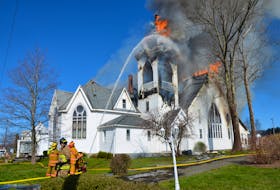SYDNEY – At a time when musical activities are being regarded with suspicion and subject to extra scrutiny, being cautious is more important than ever, says the executive director of the Nova Scotia Choral Federation.
Tim Callahan-Cross says his organization has been working with Nova Scotia’s chief medical officer of health Dr. Robert Strang and his office to come up with a new, streamlined version of protocols for singing groups to follow so they remain safe from COVID-19.
“We’ve been getting a lot of questions about what was really possible and what wasn’t so we wanted to streamline the rules a bit and make sure ours lined up really well with his (Dr. Strang’s),” says Callahan-Cross.

“So basically there isn’t a lot of change. There’s been a change in the number of people that can gather. Right now we can gather into groups up to 100 inside if it’s within an organization or 50 per cent of the capacity of the hall.”
Within that 100, there can be a small audience, as long as everyone is masked and socially distanced.
“So it does open things up a little bit. It’s still not great in terms of being able to make a profit on anything because you can’t really make a lot of money on a very small audience. However, it does allow us to rehearse more readily, and that’s really wonderful.”
Singing groups are also recommended to rehearse for 30 minutes and then take a break so the hall’s air exchange system can do its job before singing resumes.
However, finding an actual space to safely practise can be a challenge for a larger choir as Cape Breton Chorale director Ryan Billington has found out. The chorale has been on a break since mid-December and he’s hopeful they may start meeting again for in-person rehearsals within the next few weeks.
“Around the country, everybody’s situation is different based on their location so some are doing online work or virtual choir videos,” says Billington.
“We would love to meet in-person and we still can but our challenges are finding a venue that is going to work for us, that is going to allow us to be there. So that is our main challenge … we’ve been having a hard time figuring out our venue but we got something lined up so hopefully we’ll be able to do it.”
The winter months of a new year are usually spent rehearsing for a spring concert but Billington doesn’t expect that to happen this year.
“I still think (it's) not clear at this point what will be allowed in terms of audiences but we’re not planning on it,” he said. “Instead of doing concerts, we’re looking forward to making a few videos.”
Adjusting to the time and situation is all part of singing during the time of the pandemic.
“It’s slow and careful,” says Callahan-Cross.
“We’re certainly moving in the right direction and choristers almost to a person are really concerned about being safe … I think for the most part we tend to be more conservative than the guidelines require.
"We can technically perform without masks so if we were doing a recording or something we could do it without masks but any of the singers I am aware of have still opted to wear masks just because it feels safer. The last thing we want to do is create a super spreader event, especially since things are going so well.”
To keep that momentum going, the choral federation held a virtual event on Saturday to explain the new guidelines for in-person group singing.
The guidelines, which were developed by the Nova Scotia Choral Federation and reviewed by the Office of the Chief Medical Officer of Health can be found on the federation's website at http://www.nscf.ca/ .









